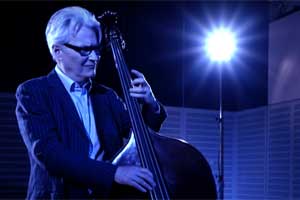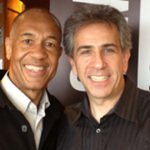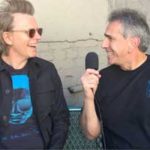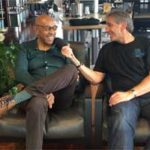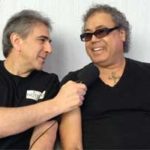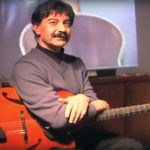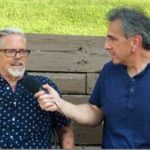FBPO goes one-on-one with the man “The Village Voice” has compared to Jimmy Blanton and Oscar Pettiford
Exclusive interview with FBPO’s Jon Liebman
May 23, 2011
Born and raised in Louisville, Kentucky, John Goldsby played piano, guitar and electric bass before discovering the double bass at age 16. In 1979, John got a gig with the house trio at a Louisville jazz club, where he performed with some of the jazz world’s greatest legends, including Jay McShann, Buddy Tate, Johnny Hartman, Barney Kessel, Tom Harrell, Dave Liebman, Buddy DeFranco and many others. When the gig ended, John packed up his bass and made the move to New York City, where he lived for fourteen years.
While in New York City, John established himself as an in-demand jazz bassist. He eventually found himself performing with the New York elite players, including Albert Dailey, Sal Nestico, John Hicks, Benny Bailey and Bob Wilber, to name a few.
Since 1994, John has been a member of the Westdeutscher Rundfunk Big Band in Cologne, Germany. He has recorded with Scott Hamilton, John Louis, Herb Ellis, Larry Coryell, Mundell Lowe, Charlie Byrd, Bill Mays and countless others, including his own trio with Peter Erskine and Bill Dobbins. Other notable performances include The Tonight Show with Claude Bolling and Hubert Laws, the Grammy-Award winning soundtrack for The Cotton Club and work with Wynton Marsalis, Gunther Schuller, Lional Hampton and the Smithsonian Masterworks Orchestra. Recent recordings with the WDR Big Band include the Grammy award-winning Avant Gershwin (Patti Austin), Symphonica (Joe Lovano), Bombella (Abdullah Ibrahim) and Roots & Grooves (Maceo Parker). Goldsby’s recordings as a leader include Tale of the Fingers (Concord), Viewpoint (Nagel-Heyer), Live at the Nachbar, The Visit, Space for the Bass, and The Innkeeper’s Gun (all Bass Lion).
Goldsby has been hailed by The Village Voice as “one of the few bassists steeped in the tradition of Jimmy Blanton and Oscar Pettiford.” The New York Times describes his bass playing as “spectacular.” John Goldsby remains actively involved in the jazz scene as a bassist, bandleader, composer, teacher, clinician and author.
FBPO: What kind of musical upbringing did you have?
JG: My father was a Baptist preacher, so I came up with the music of the church. I had piano lessons as a young kid and later tried my hand at various other instruments. It wasn’t until I was 12 that I started playing guitar with friends and felt like I was really having fun making music. The guitar led to the electric bass.
Later in my teen years, I got into rock bands like Cream, Led Zeppelin, Frank Zappa and Santana and started playing in bands with friends. When I was 15, I got in a band with some older players who were playing jazz/fusion like Mahavishnu Orchestra and Weather Report. It was through that music that I started hearing some Miles Davis. It was also about this time that I had picked up the acoustic bass.
The first Miles record I heard was Live-Evil and I thought it was incredible. I began taking bass lessons with a guitar teacher, Jeff Sherman, who had me learning jazz standards and reading out of the Carol Kaye books. When I was 17, I met Jamey Aebersold. I went to several of his jazz workshops in 1976 through ’79 and he became a mentor to me. Being one of the few bassists around Louisville at the time, I ended up playing with him quite a bit.
FBPO: What was it about the upright bass that really tripped your trigger, especially after playing piano, guitar and electric bass?
JG: I found the acoustic bass in the band room at the high school and nobody was playing it – a typical story that I hear from a lot of bassists. I had been having a lot of fun on the electric bass, but the acoustic was something that seemed like a real challenge. I loved the size of it, the warm vocal tone and the uniqueness of playing an instrument that no one else seemed to want to touch.
FBPO: I bet growing up so close to Jamey Aebersold must have quite a learning experience!
JG: I first saw Jamey around 1972 when he came to our school and did a concert with John McNeil on trumpet, Mike Tracy on sax, Charlie Craig on drums and Shelby James on piano. Jamey was playing electric bass. I couldn’t understand much of the music because, at that time, I was just playing loud rock & roll. They were playing intricate jazz tunes and improvising. I knew they were doing something cool. I just couldn’t figure out what it was.
A few years later, I enrolled in a Jamey Aebersold workshop, where I met Rufus Reid. Jamey’s workshops are inspirational events. I knew once I took his workshop that I wanted to get deeply into jazz. That was a determining factor for me to get completely into the acoustic bass—I wanted to play with Jamey and the other jazz players around Louisville who played standards. I had gotten heavily into jazz and I really wanted to sound like Paul Chambers and Ron Carter.
Eventually, since there were not too many jazz bass players in Louisville at the time, I got to play a lot with Jamey. He’s always been a great inspiration, not only to me, but to thousands of other players, as well.
FBPO: What prompted you to pick up and move to New York? Did you have anything lined up there, or did you decide to just go for it?
JG: In 1979, I was fortunate to get a job playing jazz six nights a week at a club in Louisville with pianist David Leonhardt and drummer Darryl Cotton. I really learned a lot on that gig, but after about nine months, it ended. I had been playing with some top players, but I knew if I did not go to New York, those jobs with top players would be few and far between. I felt at that point that I could either stay in Louisville or try to make a move to New York. I always knew that if things didn’t work out in New York, I would just put the bass back in the car and head home. I knew I could probably keep working at lounges in Louisville, but I wanted to be around the top-level players and most of them were in New York.
FBPO: Tell me about your experience as a jazz bass player in New York.
JG: New York has a fantastic music scene. There are thousands of players and a lot of work. When I first moved there, I was amazed that I could go out on one night, make a few rounds of the jazz clubs and hear two or three legendary bass players plus some up-and-coming players. There are always players there who are working on new music, playing jam sessions, playing door gigs and making the scene.
When I moved there in 1980, there were almost no jazz schools. It was still the era where players just moved to the city, started playing jam sessions and tried to get gigs by making contacts. I moved in with a couple of friends and we played music constantly. I started to get some little gigs and, within a few months, I was working a lot. I wasn’t making much money, but I was working a lot!
The quality of gigs slowly improved over the years and I carved out a nice living in New York, playing a combination of jazz gigs, hotel gigs, singers, big bands, studio work and teaching. I never had much of a problem working in New York. I could read well, thanks to Jeff Sherman, and I knew a lot of tunes, thanks to Jamey Aebersold, Jimmy Raney and the other Louisville heavies who I had played with. I could fit into any band and make them sound pretty good.
FBPO: What advice do you have for young wannabe bass players thinking about making the move to New York or LA or Nashville? It’s not the same as it was when you first moved there, is it?
JG: Now it seems that most young players go to New York and go to a school. That is definitely one way to do it, but then you end up paying ridiculous money for an education that you might be able to get some other way. Schools today provide the very thing I had when I moved in with my friends in 1980: constant playing, rubbing elbows with more experienced master players and plenty of time to practice. I made it a point to seek out players who I really respected and took lessons with them when I was in New York. The list included Rufus Reid, Dave Holland and Michael Moore. Those players, plus hanging out with players like Red Mitchell, really gave me a good education.
The scenes in New York, LA and Nashville have probably changed over the years, but the requirements necessary to be a successful musician have not. Complete dedication, long hours and perseverance are still required. A school can automatically provide a student with contacts and other people to play with, but you can also make a lot of contacts by hanging out at jazz clubs. Once other players know you are really dedicated and willing to play anything anytime, they will call you.
Jazz musicians play jazz. That is the important thing to remember, whether you are going to school or just moving to a big city. Keep playing, practicing, listening and making contacts and don’t give up. Always support other musicians, but also demand a high standard of excellence from yourself and others.
FBPO: What made you decide to move to Germany? That’s a much bigger leap than going from Louisville to New York!
JG: Even when I was in New York, I did not like to travel. I always preferred to stay and work in town rather than go on the road. Despite my reluctance to travel, I was going out with various bands about three or four months out of the year, even though I had several steady jobs in New York. My son was born in ’92 and my wife and I were thinking about moving to New Jersey or somewhere close by in order to have a calmer family life.
I was traveling around Europe in ’92 with Louie Bellson’s band and Louie and I got invited as guests to play with the WDR – Westdeutscher Rundfunk – Big Band. I realized at that time that the bass chair in the band was opening up and I applied for the job. After a very long audition process, they invited me to join the band in ’94. It’s a permanent job, somewhat like an orchestra contract, but we play jazz projects. There are about 220 musicians employed at the WDR Radio and TV station: a symphony orchestra, a radio orchestra, a choir and the WDR Big Band, which is funded by a tax and government funds. For me, it is the perfect situation to have a nice family life, play good music with the WDR Big Band and still have free time to pursue my own projects. I play electric bass and double bass with the WDR Big Band.
FBPO: How would you compare the jazz scene in Europe with that of the United States?
JG: The European jazz scene has really developed over the past few decades, due in large part to social acceptance of the arts and a dedication to cultural activities. There is broad public support for the arts, especially in Germany. The Europeans are now starting to see their contribution to jazz and modern music as independent from the American jazz history. They know that jazz is an American invention, but they see that in a historical context.
There are many European musicians who are taking the jazz language and adding their own perspective. The music they create is not bound by many of the cookie-cutter styles I hear coming out of the US these days. That said, the Europeans sometimes ignore swing and the blues, which, to me, are defining factors in the music I like to listen to and play. The swing and blues elements are essential to jazz. Unfortunately, I don’t hear those elements enough in music today. There are no exact comparisons between American and European jazz, only broad generalizations. I am very fortunate that I can experience both perspectives in my career.
FBPO: What lies ahead for you and your career? What else can we expect to see and hear from John Goldsby in the future?
JG: I will of course continue to work with the WDR Big Band. We do about twenty-five projects per year that are recorded for radio or TV. Some of those come out on CD and some are only performed and recorded for broadcast. With my own groups, I am performing and planning new projects all the time. I am planning another tour and CD with Jacob Duncan and Jason Tiemann. We have made a couple of nice albums: Live at the Nachbar and The Innkeeper’s Gun. I really enjoy that trio.
Recently, I have been doing more concerts with my quartet from the Space for the Bass album. I also work often with pianist Hubert Nuss, saxophonist Karolina Strassmayer, pianist Frank Chastenier and trumpeter John Marshall. I am in the fortunate position to be able to play a lot, so finding the time to do everything I like to do is my main problem.
I also enjoy teaching and writing about bass playing. I’ve been writing regularly for Bass Player magazine for twenty years and I am planning a new series of jazz bass method books. I want to plan that project carefully so I give my fellow bassists some useful material, rather than just adding to the heap of books already out there on the market.
FBPO: What would you be if you were not a bass player?
JG: When I was really getting into playing the bass, my parents started asking me about learning another skill so I would have “something to fall back on.” So I learned to juggle. I think that was my way of making sure I had nothing to fall back on if the bass playing thing didn’t work out. I didn’t want that option or the luxury of giving up.
